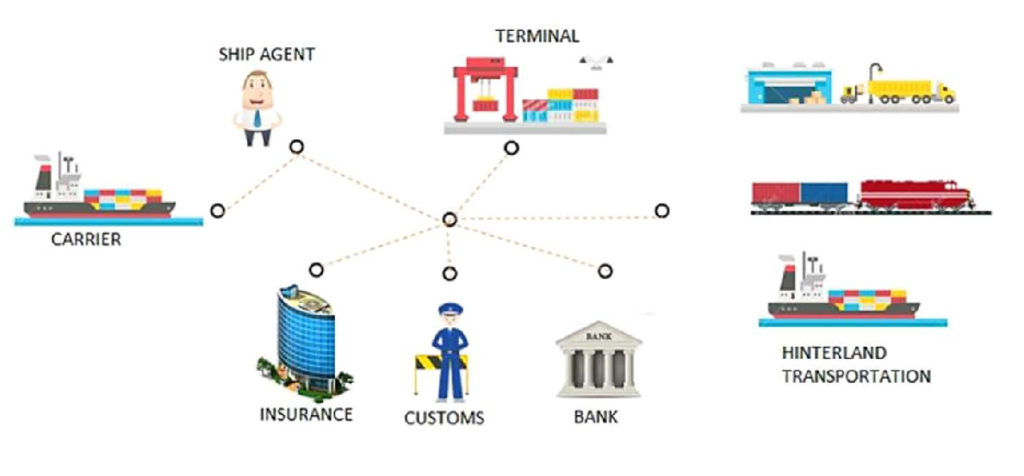The logistics industry plays a vital role in the ever-evolving global trade. However, despite centuries of progress and modern innovations, challenges such as delays, lost packages, and escalating costs continue to plague the field. Yet, on the horizon, a transformative solution is emerging: decentralized shipping platforms, powered by the integration of blockchain technology.
Blockchain Technology
Imagine a series of connected blocks, each holding a piece of information. These blocks collaborate to form a chain, embodying the unique strength of blockchain technology. It’s a collective effort where each participant contributes a puzzle piece. Before we dive into the revolutionary impact of blockchain on shipping, it’s also essential to comprehend its capabilities:
1. Decentralized Control: Imagine a network that operates globally without a central authority. Blockchain also exemplifies this concept, creating a shared system that transcends geographical boundaries.
2. Permanence of Records: Envision information recorded in an unchangeable book. This also reflects blockchain’s nature, where data once added becomes an immutable part of the system, also ensuring security and accuracy.
3. Transparency in Transactions: Within the blockchain network, all participants gain immediate visibility into transactions. This real-time updating mechanism enhances transparency, also enabling all users to observe changes.

Applications of Blockchain in Shipping
1. Real-Time Shipment Tracking
Traditional shipment tracking methods are plagued by delays and inefficiencies. Blockchain also ushers in a new era of real-time data access that transcends geographical limitations. This also facilitates efficient shipment management, regardless of location.
2. Smarter Documentation for Shipping
Handling crucial shipping documents often leads to complications. Blockchain also transforms this landscape by enabling real-time cargo tracking, diminishing paperwork, reducing errors, and cutting expenses associated with document dispatch.
3. Simplifying Deals with Smart Contracts
The intricacies of shipping deals can be bewildering. Smart contracts simplify this landscape. They represent digital agreements that streamline payment processing and shipment tracking, obviating the need for paper documentation.
4. Paving the Way for Cleaner Fuel
Cargo ships generate substantial pollution. Blockchain also offers a solution by ensuring the utilization of cleaner fuel options. This not only supports environmental preservation but also enhances human well-being.

Benefits of Blockchain in Shipping
As technology continues to evolve and industries seek equilibrium between progress and environmental stewardship, the trajectory of blockchain in shipping also holds promise and potential.
1. Cost-Efficiency
The Blockchain technology in shipping also offers cost reduction through blockchain implementation. This includes minimizing manual labor, curtailing courier expenses, and countering fraudulent activities.
2. Enhanced Communication
Blockchain optimizes communication with industry stakeholders, providing swift and straightforward data access through open platforms. This also eliminates the need for time-consuming emails and calls. Information transcends centralization within the blockchain network. Data accessibility is also democratized, enabling users worldwide to access synchronized information in real time.
3. Elevated Security
Blockchain’s decentralized nature also renders external hacking threat. The employment of encrypted technology verifies, shares, and records data, also creating a robust defense against fraud and human error.
4. Efficiency
On a broader canvas, blockchain also elevates the shipping industry’s overall efficiency. It diminishes manual workloads, enhances schedule accessibility, accelerates payment processing, and reinforces security.
5. Sustainability
In the world of global trade, the shipping industry shoulders a significant burden, contributing a staggering 90% of the trade volume. This continuous surge in demand for ships also takes its toll on the environment, resulting in far-reaching consequences.
6. Port Efficiency
Mismanagement and communication lapses often lead to ships languishing in ports, expending fuel and releasing greenhouse gases. Blockchain’s potential in this sphere lies in its capacity to counter congestion, miscommunication, and scheduling discrepancies. Authorized users gain access to real-time tracking and scheduling data, also eliminating administrative obstacles that historically hindered operations.
Streamlined efficiency facilitates precise scheduling, which in turn leads to emissions reduction, fuel conservation, and also a greener shipping industry.
7. Fuel Quality
Another benefit of blockchain’s contribution to sustainability lies in the domain of fuel quality tracing. In a world grappling with climate crises, industries are united in their pursuit of reducing carbon footprints. The shipping sector, known for high pollution levels due to substandard “bunker” fuel, can also find reprieve in blockchain’s tracking.
Blockchain technology also charts the journey of fuels, enabling ships to opt for cleaner alternatives. This transition is facilitated through platforms that provide secure and accurate fuel information to users on the network. The ensuing compliance with the International Maritime Organization (IMO) standards ensures fuel data accuracy and heralds an era of environmental responsibility.
Challenges in implementing Blockchain Technology in Shipping
While blockchain holds immense promise, navigating its implementation is not without challenges.
1. Financial Considerations
Setting up blockchain initially incurs expenses. Ongoing maintenance and the need for expert support during the teething phase also adds to the financial burden.
2. Transition from Legacy Systems
Transitioning from traditional systems to blockchain also demands time and financial investment. Staff accustomed to legacy systems require rigorous training to harness the potential of blockchain effectively.
3. Energy Consumption
The real-time operation of blockchain also demands substantial energy resources. Communication among nodes within the network requires significant computing power, translating to energy consumption. This not only adds to operational costs but also raises environmental concerns, particularly in the context of global efforts to reduce carbon footprints.
Our Services
Genesis Convergence plays a crucial role in advancing decentralized shipping platforms. With our strong technological expertise, we are well-positioned to drive innovation in the global shipping and logistics sector. Our experienced team also specializes in creating cutting-edge blockchain solutions that ensure secure data exchange across the supply chain. Understanding the challenges of the industry, we collaborate closely with partners to design and implement effective decentralized systems that improve transparency, traceability, and overall efficiency.
Our proficiency in blockchain, IoT integration, and smart contract development enables us to contribute to the development of platforms. By enabling real-time tracking, automated processes, and data security, we are also actively shaping the evolution of decentralized shipping. At Genesis Convergence, we are committed to enhancing global trade efficiency and accountability through technological advancements.
